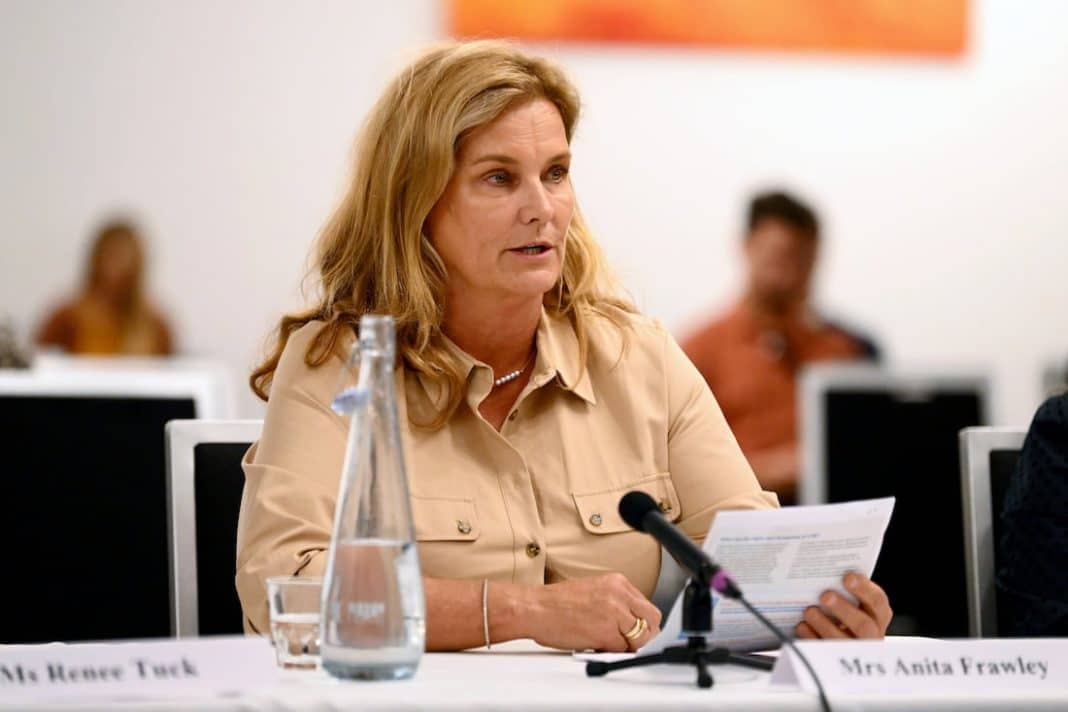The loved ones of concussed AFL players have shared heartbreaking stories of tragedy and loss while calling on the league to provide more support after head injuries.
Speaking at a senate inquiry into concussions on Wednesday, widow Anita Frawley fought back tears as she recalled losing husband of more than 30 years Danny Frawley in a car crash four years ago.
The star footballer had just turned 56.
Mr Frawley, who played 240 games for St Kilda, suffered from severe chronic traumatic encephalopathy (CTE) and Ms Frawley hopes speaking out will help other players get the support they need.
“Our lives will forever be touched by sadness even in our happiest times,” she told the inquiry.
“I can’t change the past but I can have a hand at changing the future … We must act to stop athletes from taking the field when they’re concussed.”
She said a comprehensive health support scheme was needed to improve concussion rates.
Ms Frawley’s testimony followed experts’ calls for the AFL to introduce a policy around CTE and change its culture around concussions to better protect players.
About 80 players are diagnosed with concussion each season in the AFL and AFLW.
The league’s legal chief noted that concussion guidelines were in place and that there is a link between repetitive head trauma and CTE.
“We don’t need to have a policy to show how seriously we take CTE in our sport,” Stephen Meade told the inquiry.
AFL medical chief Michael Makdissi said the the league needed to work more closely with the players association to address concussions.
“I’ve seen quite a shift in culture, I don’t think we’re there yet,” he said.
“We need some continued education.”
In March, Margalit Injury Lawyers lodged a landmark class action against the AFL in the Supreme Court of Victoria, seeking compensation for injuries caused to former players for pain and suffering, economic loss and medical expenses.
Managing principal Michel Margalit called on state and federal governments to fix the “gaping hole” in the current compensation scheme.
In a written submission, a former football executive said he felt ashamed and distressed watching sporting bodies fail to protect players.
John Hennessy, a former Victorian Football League corporate planner who helped steer the development of the national AFL competition in the 1980s, labelled the concussion crisis a “national disgrace” in his submission to the committee probe.
“The most important possession anyone has is their brain,” he wrote.
“At the moment we are not adequately protecting it when playing sport. Children, in particular, are at high risk.
“We are gambling with people’s lives.”
Mr Hennessy is among witnesses slated to give public evidence.
The AFL, the AFL Players Association, Cricket Australia and medical professionals also testified on Wednesday.
Mr Hennessy pointed to soaring rates of concussion and hospitalisations in junior football, an increasing incidence in the AFL and ongoing problems for thousands of past players facing inadequate support in dealing with mental health issues and early-onset neurodegenerative diseases.
The AFL, in its written submission to the inquiry, acknowledged that head trauma appeared to be associated with an increased risk of neurodegenerative disease.
But it said its association with long-term psychological health was less clear.
The AFL pointed to its five-year concussion strategic plan among ways it was addressing the risk, along with guidelines on the need for a more conservative approach when it came to children and adolescents.
Cricket Australia told the inquiry it was reviewing its concussion policies and that an estimated 20 concussions happen a year across 300 players.
Lifeline 13 11 14
beyondblue 1300 22 4636



